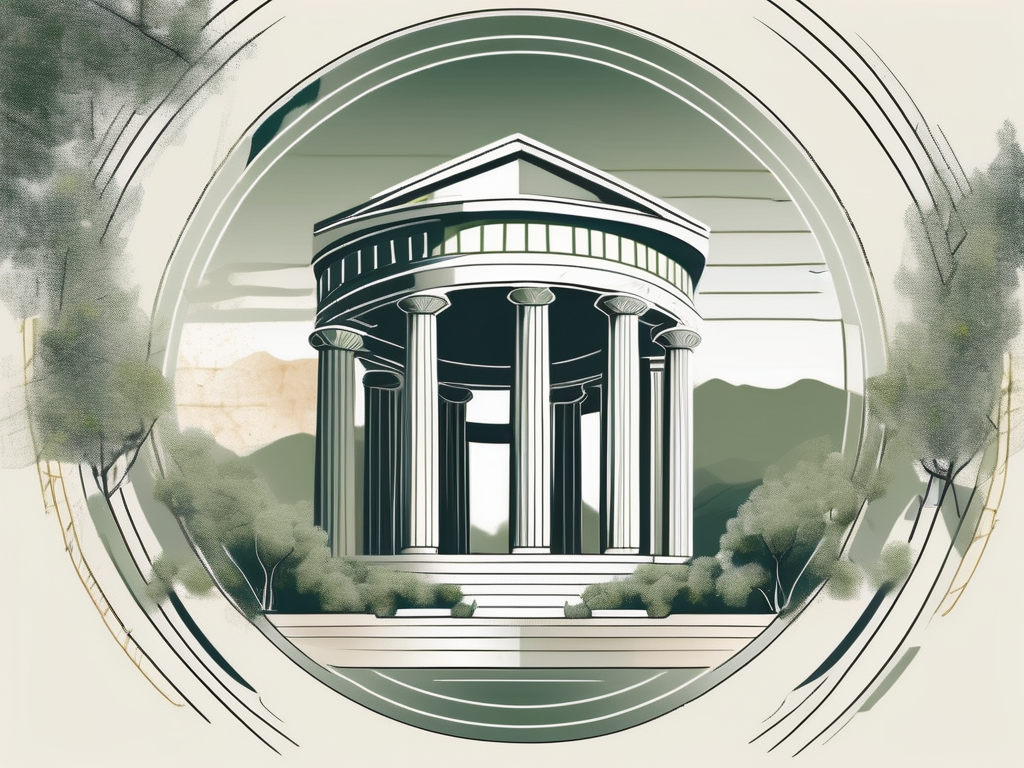Life is a mystery. It’s a paradox we all grapple with at some point. What is the meaning of life? Why are we here? These questions have plagued philosophers, scientists, and thinkers throughout the ages. While many theories and perspectives exist, one that stands out is Stoicism. In this article, we’ll delve into the Stoic perspective on life’s meaning and explore how it can provide insights and guide us in our search for purpose.
Understanding Stoicism: A Brief Overview
Before we dive into the Stoic perspective on life, let’s take a moment to understand what Stoicism really is. Stoicism is an ancient philosophy that originated in Greece and was later embraced by the Romans. It emphasizes the importance of reason, virtue, and living in accordance with nature. Stoics believe that the key to a meaningful life lies in developing inner strength and resilience.
Stoicism, as a philosophy, has a rich history that dates back to the 3rd century BC. It was founded by Zeno of Citium, a Greek philosopher who taught his students in a painted porch, or “stoa” in Greek, which gave the philosophy its name. Over time, Stoicism gained popularity and spread throughout the Roman Empire, influencing many prominent figures such as Seneca, Epictetus, and the Roman Emperor Marcus Aurelius.
The Core Principles of Stoicism
At the heart of Stoicism are several core principles that guide a Stoic’s life. These principles include practicing virtue, accepting the things we cannot control, and focusing on our own thoughts and actions rather than external events. Stoics suggest that by understanding and embracing these principles, we can find fulfillment and meaning in our lives.
Practicing virtue is a fundamental aspect of Stoicism. Stoics believe that virtue is the highest good and that it should be the ultimate goal of every individual. Virtue, in the Stoic sense, encompasses qualities such as wisdom, courage, justice, and self-discipline. By cultivating these virtues, Stoics aim to live a life of moral excellence and inner harmony.
Another key principle of Stoicism is the acceptance of things we cannot control. Stoics recognize that there are many aspects of life that are beyond our control, such as the actions of others, natural disasters, or even our own physical limitations. Instead of wasting energy and becoming frustrated by these uncontrollable factors, Stoics advocate for acceptance and focusing on what we can control: our own thoughts and actions.
The Stoic View of Life
According to Stoicism, life is not about chasing momentary pleasures or avoiding pain. It’s about living in alignment with nature and accepting the transient nature of all things. Stoics believe that the only things we can truly control are our own thoughts and actions. By focusing on developing our virtues and aligning our lives with reason, we can find meaning amidst life’s uncertainties and challenges.
Stoicism teaches us to embrace the impermanence of life and to find contentment in the present moment. Rather than being consumed by desires for material possessions or external achievements, Stoics encourage us to cultivate an inner state of tranquility and peace. By detaching ourselves from external outcomes and focusing on our own character development, we can navigate life’s ups and downs with equanimity.
Stoicism also emphasizes the importance of reason in guiding our actions and decisions. Stoics believe that by using our rational faculties, we can make sound judgments and act in accordance with nature. Reason allows us to see beyond immediate gratification and consider the long-term consequences of our choices. By aligning our actions with reason, Stoics believe that we can lead a virtuous and fulfilling life.
In conclusion, Stoicism offers a unique perspective on life that encourages individuals to cultivate inner strength, embrace the transient nature of existence, and focus on what is within their control. By practicing virtue, accepting the things we cannot change, and aligning our lives with reason, Stoics believe that we can find meaning and fulfillment in an uncertain world.
The Stoic Perspective on Life’s Meaning
Now that we have a foundation in Stoicism, let’s explore how Stoics view life’s meaning and purpose.
Stoicism, an ancient philosophy founded in Athens by Zeno of Citium, emphasizes the importance of living a virtuous life. Stoics believe that true fulfillment comes from developing virtues such as wisdom, courage, and justice. These virtues serve as guiding principles for Stoics, shaping their actions and decisions.
The Role of Virtue in a Stoic’s Life
For Stoics, virtue plays a central role in life. Virtue, in this context, refers to qualities such as wisdom, courage, and justice. Stoics believe that true fulfillment comes from developing these virtues and aligning our actions with them. By pursuing virtue, we can lead a meaningful and fulfilling life, irrespective of external circumstances.
Stoics understand that life is filled with challenges and obstacles, but they believe that it is through the practice of virtue that we can navigate these difficulties with grace and resilience. By cultivating wisdom, we gain the ability to make sound judgments and decisions. Through courage, we find the strength to face adversity and overcome our fears. And by embracing justice, we contribute to the betterment of society and the well-being of others.
Acceptance and Tranquility: Key Stoic Beliefs
In the Stoic perspective, finding meaning in life involves accepting the things we cannot change and focusing on what is within our control. Stoics advocate for embracing setbacks, disappointments, and even the inevitability of death. By accepting these aspects of life, we can attain tranquility and live in harmony with the natural order of things.
Stoics believe that much of our suffering arises from our resistance to the inevitable. By accepting that we cannot control external events or the actions of others, we free ourselves from unnecessary anguish. Instead, Stoics encourage us to focus on what we can control: our own thoughts, actions, and attitudes. By directing our energy towards what is within our power, we can find peace of mind and live a more meaningful life.
Furthermore, Stoics emphasize the importance of living in accordance with nature. They believe that everything in the universe is interconnected and follows a predetermined order. By aligning our actions with this natural order, we can live in harmony with the world around us. This alignment brings a sense of purpose and meaning to our lives, as we recognize our place within the grand scheme of things.
In conclusion, Stoicism offers a unique perspective on life’s meaning and purpose. By cultivating virtues, accepting the inevitable, and living in accordance with nature, Stoics strive to lead meaningful and fulfilling lives. Through their philosophy, they seek to find tranquility and inner peace, regardless of the external circumstances they may face.
Stoicism and the Modern World
While Stoicism originated thousands of years ago, its principles still hold relevance in today’s fast-paced and unpredictable world.
Stoicism, a philosophy that dates back to ancient Greece, has experienced a resurgence in popularity in recent years. Its teachings offer valuable insights and practical advice for navigating the complexities of modern life. By adopting Stoic principles, individuals can find solace and strength in the face of adversity, and cultivate a sense of inner peace and purpose.
Applying Stoic Principles in Today’s Society
Stoic principles can be applied to various aspects of our lives. From dealing with work-related stress to navigating personal relationships, Stoicism offers valuable insights. By focusing on what is within our control and practicing virtues such as patience and resilience, we can find meaning in our actions and relationships.
At work, Stoicism can help individuals cope with the pressures and demands of their careers. By recognizing that external circumstances are beyond their control, Stoics focus on their own attitudes and behaviors. This shift in perspective allows them to approach challenges with a calm and rational mindset, finding solutions instead of becoming overwhelmed by stress.
In personal relationships, Stoicism teaches us to detach ourselves from the outcomes and expectations we may have. By accepting that we cannot control the actions or emotions of others, we can focus on our own actions and cultivate virtues such as empathy and understanding. This approach fosters healthier and more fulfilling relationships, as we learn to appreciate and accept others for who they are.
The Relevance of Stoicism in Contemporary Life
In an era marked by constant change and uncertainty, Stoicism provides a guiding light. It encourages us to detach ourselves from external outcomes and focus on our own attitudes and behaviors. By embracing Stoic principles, we can cultivate a sense of purpose and inner peace, even amidst the chaos and challenges of the modern world.
One of the key teachings of Stoicism is the concept of “Amor Fati” or love of fate. This principle urges individuals to embrace whatever life throws at them, whether it be success or failure, joy or sorrow. By accepting and embracing the present moment, Stoics find contentment and fulfillment, regardless of external circumstances.
Furthermore, Stoicism emphasizes the importance of living in accordance with nature. In today’s society, where technology and materialism often disconnect us from the natural world, Stoicism reminds us to appreciate the beauty and simplicity of the natural world. By reconnecting with nature, whether through spending time outdoors or practicing mindfulness, individuals can find a sense of grounding and perspective.
Stoicism also teaches us the value of self-reflection and introspection. In a world filled with distractions and constant stimulation, taking the time to pause and reflect on our thoughts and actions is crucial. By practicing self-awareness and examining our own beliefs and values, we can align our actions with our true selves and live a more authentic and fulfilling life.
Critiques and Counterarguments to Stoicism
While Stoicism has its merits, it is not without its fair share of critiques and counterarguments. Let’s explore some of the common misconceptions about Stoicism and address the criticisms it faces.
Common Misconceptions about Stoicism
One common misconception about Stoicism is that it promotes emotional detachment or indifference. However, Stoicism advocates for acknowledging and understanding our emotions rather than suppressing them. Stoics believe that by developing emotional intelligence, we can respond to life’s challenges with composure and clarity.
Stoicism recognizes that emotions are a natural part of being human. Instead of denying or avoiding them, Stoics encourage individuals to embrace their emotions and use them as a guide for self-reflection and growth. By understanding the root causes of our emotions, we can gain valuable insights into our thoughts and behaviors, leading to a more fulfilling and meaningful life.
Moreover, Stoicism emphasizes the importance of cultivating virtues such as wisdom, courage, justice, and temperance. These virtues help individuals navigate their emotions in a balanced and rational manner, enabling them to make sound decisions and maintain healthy relationships.
Addressing the Criticisms of Stoicism
Another criticism of Stoicism is that it encourages passivity and resignation. However, Stoics argue that accepting the things we cannot control is not equivalent to surrendering to fate. Instead, it’s about redirecting our energy towards what is within our power and taking positive action. Stoicism teaches us to navigate life’s uncertainties with grace and resilience.
Stoics believe that by focusing on what is within our control, we can make a meaningful impact on our lives and the lives of others. They advocate for taking responsibility for our actions, thoughts, and emotions, rather than being consumed by external circumstances beyond our control. This proactive approach empowers individuals to find purpose and meaning in every situation, even in the face of adversity.
Furthermore, Stoicism encourages individuals to cultivate a sense of gratitude and appreciation for the present moment. By practicing mindfulness and embracing the here and now, Stoics argue that we can find contentment and serenity, regardless of the external circumstances. This mindset shift allows individuals to find joy and fulfillment in the present moment, rather than constantly chasing after future desires or dwelling on past regrets.
In conclusion, while Stoicism may face critiques and counterarguments, it offers valuable insights and practical tools for leading a more fulfilling and virtuous life. By understanding and addressing these criticisms, we can gain a deeper appreciation for the philosophy and its potential to transform our perspectives and actions.
The Lasting Impact of Stoicism on Philosophy and Life
Throughout history, Stoicism has left a lasting legacy on both philosophy and how we perceive and approach life.
Stoicism’s Influence on Modern Philosophy
Many modern philosophers draw inspiration from Stoic principles. From existentialists like Albert Camus to cognitive-behavioral therapists, the Stoic perspective on life’s meaning continues to shape contemporary thought. Stoicism’s emphasis on personal responsibility and inner transformation resonates with individuals seeking meaning and fulfillment.
The Legacy of Stoicism in Understanding Life’s Meaning
Stoicism’s impact extends beyond academic circles. Its teachings have influenced countless individuals who strive to lead lives of purpose and virtue. By embracing the Stoic perspective on life’s meaning, we can navigate the complexities of existence with wisdom, resilience, and a sense of inner fulfillment.
In conclusion, Stoicism offers a unique perspective on life’s meaning. By cultivating virtues, practicing acceptance, and focusing on what is within our control, we can find fulfillment and purpose amidst life’s uncertainties. Whether it’s ancient Rome or the modern world, Stoicism continues to provide valuable insights for those seeking to unveil the meaning of life.












